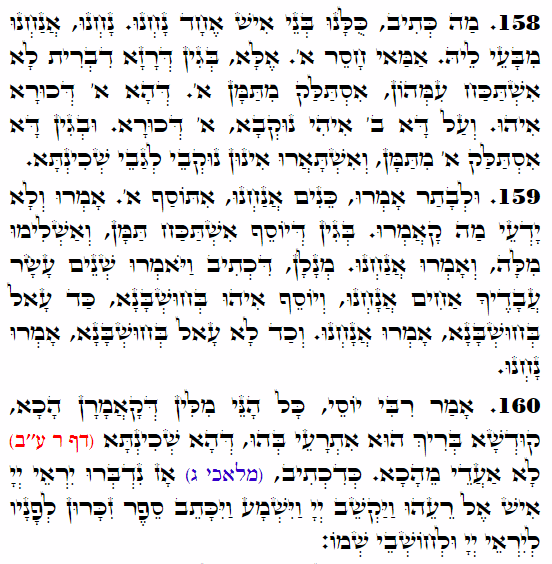Daily Zohar # 4428 – Miketz – We are missing Aleph
Daily Zohar 4428

Hebrew translation:
159. אַחַר כָּךְ אָמְרוּ כֵּנִים אֲנַחְנוּ. נוֹסְפָה א’. אָמְרוּ וְלֹא יָדְעוּ מָה אָמְרוּ, מִשּׁוּם שֶׁיּוֹסֵף נִמְצָא שָׁם, וְהִשְׁלִימוּ הַדָּבָר וְאָמְרוּ אֲנַחְנוּ. מִנַּיִן לָנוּ? שֶׁכָּתוּב וַיֹּאמְרוּ שְׁנֵיהֶם עָשָׂר עֲבָדֶיךָ אַחִים אֲנַחְנוּ. וְיוֹסֵף הוּא בַּחֶשְׁבּוֹן. כְּשֶׁנִּכְנַס בַּחֶשְׁבּוֹן, אָמְרוּ אֲנַחְנוּ. וּכְשֶׁלֹּא נִכְנַס בַּחֶשְׁבּוֹן, אָמְרוּ נָחְנוּ.
160. אָמַר רַבִּי יוֹסֵי, כָּל הַדְּבָרִים הַלָּלוּ שֶׁאָמַרְנוּ כָאן, הַקָּדוֹשׁ בָּרוּךְ הוּא הִתְרַצָּה בָהֶם, שֶׁהֲרֵי הַשְּׁכִינָה לֹא זָזָה מִכָּאן, כַּכָּתוּב (מלאכי ג) אָז נִדְבְּרוּ יִרְאֵי ה’ אִישׁ אֶל רֵעֵהוּ וַיַּקְשֵׁב ה’ וַיִּשְׁמָע וַיִּכָּתֵב סֵפֶר זִכָּרוֹן לְפָנָיו לְיִרְאֵי ה’ וּלְחֹשְׁבֵי שְׁמוֹ.
.
Zohar Miketz
Continued from previous DZ
#158
Genesis 42:11
“כֻּלָּנוּ בְּנֵי אִישׁ אֶחָד נָחְנוּ כֵּנִים אֲנַחְנוּ לֹא הָיוּ עֲבָדֶיךָ מְרַגְּלִים.”
“We (נָחְנוּ) are all one man’s sons; we (אֲנַחְנוּ) are honest men; your servants are not spies.”
He asks, the word “נָחְנוּ” (nachnu) missing an Aleph (א) and therefore seemingly should be “אֲנַחְנוּ” (anachnu). The absence of the Aleph, which represents the masculine aspect of Joseph, indicates that Joseph is not present with them. This absence transforms the word from “anachnu” (אנחנו), which includes the masculine Aleph, to “nachnu” (נחנו), reflecting feminine letters on the side of the Shechina.
#159
Then they said, ‘We (אֲנַחְנוּ) are honest men,’ the ‘א’ Aleph was added. They said it but did not understand what they were saying because since Joseph was there, they completed the word and said ‘אֲנַחְנוּ’ [anachnu]. Where do we get this from? For it is written,
Genesis 42:13
“וַיֹּאמְרוּ שְׁנֵים עָשָׂר עֲבָדֶיךָ אַחִים אֲנַחְנוּ בְּנֵי אִישׁ אֶחָד בְּאֶרֶץ כְּנָעַן וְהִנֵּה הַקָּטֹן אֶת אָבִינוּ הַיּוֹם וְהָאֶחָד אֵינֶנּוּ.”
“And they said, “Your servants are twelve brothers, the sons of one man in the land of Canaan; and the youngest is with our father today, and one is no more.”
In this verse, they said “we” “אֲנַחְנוּ” (anachnu) when Joseph was included in the count. And when he was not included in the count, they said ‘נחנו’ (nachnu).
#160
Rabbi Yosei says, “All these things that we have said here, the Holy One, Blessed be He, has found favor in them, for the Shechinah has not moved from here, as it is written;
Malachi 3:16
“אָז נִדְבְּרוּ יִרְאֵי יְהוָה אִישׁ אֶל רֵעֵהוּ וַיַּקְשֵׁב יְהוָה וַיִּשְׁמָע וַיִּכָּתֵב סֵפֶר זִכָּרוֹן לְפָנָיו לְיִרְאֵי יְהוָה וּלְחֹשְׁבֵי שְׁמוֹ.”
“Then those who feared YHVH spoke to one another, And YHVH listened and heard them; So a book of remembrance was written before Him For those who fear YHVH And who meditate on His name.”
The Holy One paid attention and heard them, and a book of remembrance was written before Him for those who fear Hashem and esteem His name.
{||}

 Previous: Miketz
Previous: Miketz
